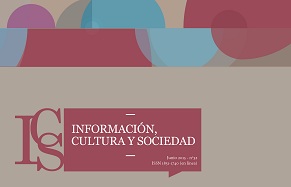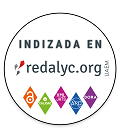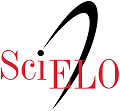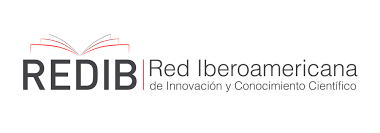The archives of evil: A speech without an author? Ildefonso Nalda Nájera in Archiv der KZ-Gedenkstätte Mauthausen
Abstract
Based on the meaning of “archive” found in the L’archéologie du savoir by Michel Foucault and the interpretations that Giorgio Agamben makes of it in Quel che resta di Auschwitz, we present some considerations on the concept of author that we have called “archives of evil”. We use this expression to nominate documentary sets resulting from situations or regimes enabling of dissimilar scenarios of violence. These archives were mostly originated in the exercise of institutional functions. Today they are part of the funds of the commonly called “historical memory centers”, regulated by the exercise of democratic rights. The biography of Ildefonso Nalda Nájera, who died in the Mauthausen Concentration Camp, and the Archiv der KZ-Gedenkstätte Mauthausen, that nowadays holds documents and objects related to the Concentration Camp, constitute the model that has guided this article.Downloads
References
Agamben, Giorgio. 2005. Lo que queda de Auschwitz (El archivo y el testigo. Homo Sacer III). Valencia: Pre-textos.
Agamben, Giorgio. 2012. Teología y lenguaje. Del poder de Dios al juego de los niños [¿Qué es una orden?]. Buenos Aires: Las Cuarenta.
Aguirre, Jesús Vicente. 2008. Aquí nunca pasó nada. La Rioja, 1936. Logroño: Editorial Ochoa.
Alberch Fugueras, Ramón. 2008. Archivos y derechos humanos. Gijón: Trea.
Alberch Fugueras, Ramón y José Ramón Cruz Mundet. 1999. ¡Archívese! Los documentos del poder. El poder de los documentos. Madrid: Alianza Editorial.
Arendt, Hannah. 1999. [1963]. Eichmann en Jerusalén. Un estudio sobre la banalidad del mal. Barcelona: Editorial Lumen.
Arfuch, Leonor. 2008. Crítica cultural entre política y poética. Buenos Aires: FCE.
Bauman, Zygmunt. 2007. Miedo líquido. La sociedad contemporánea y sus temores. Barcelona: Paidós.
Bermejo, Benito y Sandra Checa. 2006. Libro Memorial: españoles deportados a los campos nazis, 1940-1945. Madrid: Ministerio de cultura.
Checa, Sandra; Ángel del Río y Ricardo Martín. 2006. Andaluces en los campos de Mauthausen. Sevilla: Centro de Estudios Andaluces/Consejería de la Presidencia de la Junta de Andalucía.
Derrida, Jacques. 1997. Mal de archivo. Una impresión freudiana. Madrid: Trotta.
Farge, Arlette. 1991. La atracción del archivo. Valencia: Alfons el Magnànim.
Farge, Arlette. 1994. La vida frágil: violencia, poderes y solidaridades en el París del siglo XVIII. México DF: Hachette.
Foucault, Michel. 1970. El orden del discurso. Barcelona: Tusquets.
Foucault, Michel. 1983 [1969]. La arqueología del saber. México DF: Siglo XXI editores.
Höss, Rudolf. 2009. Yo, comandante de Auschwitz. Barcelona: Ediciones B.
Levi, Primo. 1995 [1958]. Si esto es un hombre. Barcelona: Muchnik Editores.
Memorial Book for the Dead of the Mauthausen Concentration Camp. Volume 1: Commentaries and Biographies. 2016. Andreas Kranebitter, ed. Viena: Association for Remembrance and Historical Reserch in Austrian Concentration Camp Momorials.
Mínguez, Adrián Blas. 2010. Campo de Gusen. El cementerio de los republicanos españoles. Madrid: “Memoria Viva”, Asociación para el Estudio de la Deportación y el Exilio Español.
Muntión Hernáez, Carlos. 2005. Nacer en Tricio. Morir en Mauthausen. Ildefonso Nalda Nájera. Tricio (La Rioja), 23/01/1876 - Mauthausen, 04/04/1941. En Piedra de rayo. Revista riojana de cultura popular. No. 16, 10-26.
Nunca más, informe final de la Comisión Nacional sobre la Desaparición de Personas. 1984. Buenos Aires: Eudeba.
Parada, Alejandro E. 2012. El dédalo y su ovillo. Ensayos sobre la palpitante cultura impresa en la Argentina. Buenos Aires: Universidad de Buenos Aires. Facultad de Filosofía y Letras. Instituto de Investigaciones Bibliotecológicas.
Rodríguez de Diego, José Luis. 2000. Significado del proyecto archivístico de Felipe II. En Alvar Ezquerra, A., coord. Imágenes históricas de Felipe II. Madrid: Centro de Estudios Cervantinos.
Zsolt, Béla. 2004. Nueve maletas. Bogotá: Taurus.
Copyright (c) 2019 Información, cultura y sociedad

This work is licensed under a Creative Commons Attribution-ShareAlike 4.0 International License.
Authors publishing in this journal acknowledge the conditions below:
- Authors retain the copyright of their work while they transfer the right of the first publishing to the journal, under the Creative Commons Attribution-ShareAlike 4.0 International (CC BY-SA 4.0) Licence, which allows third parties to reproduce them under the condition that express mention is given to the author and to its original publication in the journal.
- Authors may enter into other contractual and independent arrangements for the non-exclusive distribution of the version of the article published in this journal (for instance, it can be published in an institutional repository or in a book). In any case, an express mention should be given to its first publication in the journal.
- It is permitted and encouraged to publish online the articles (for example, on institutional or personal pages).























